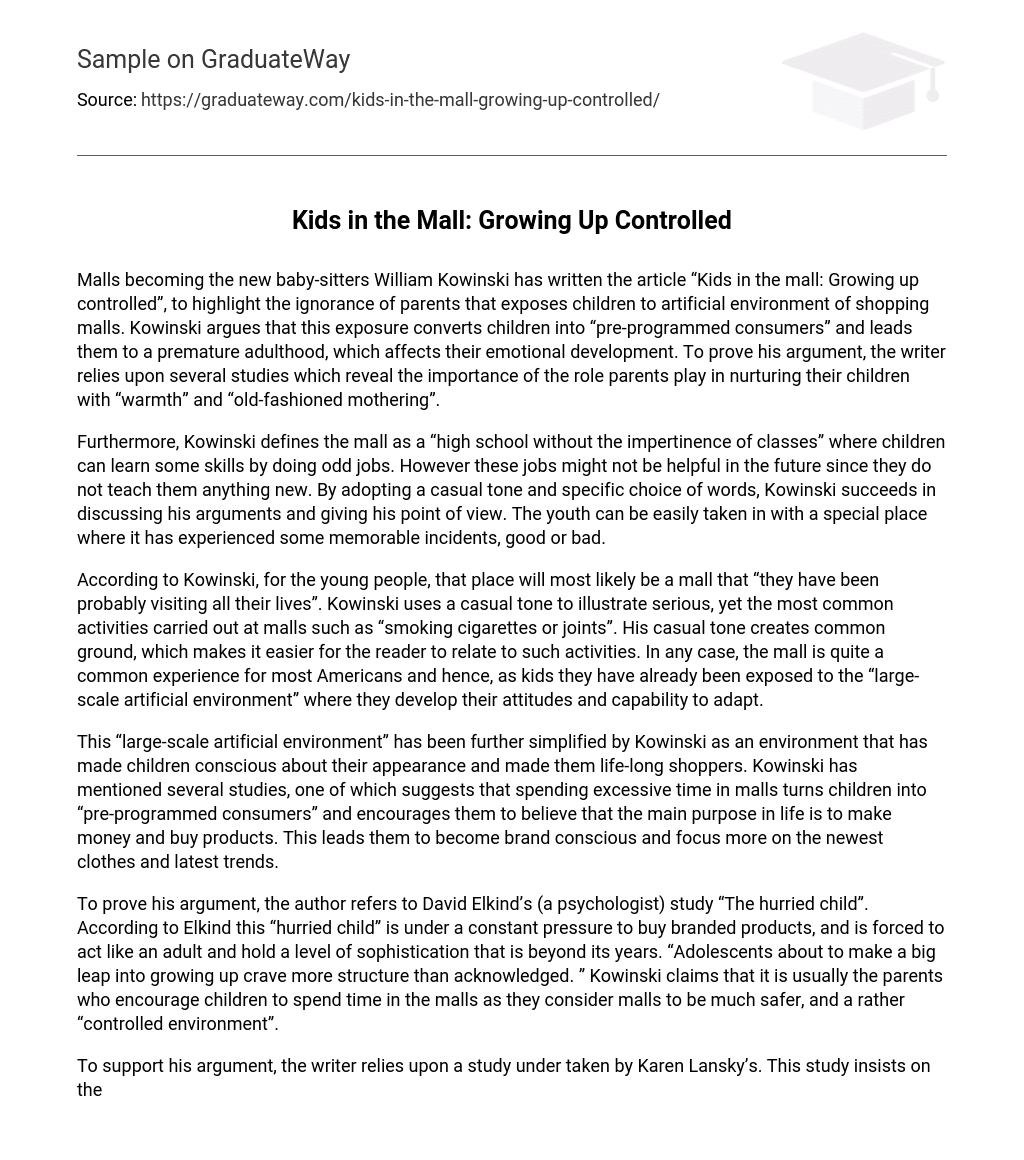Malls becoming the new baby-sitters William Kowinski has written the article “Kids in the mall: Growing up controlled”, to highlight the ignorance of parents that exposes children to artificial environment of shopping malls. Kowinski argues that this exposure converts children into “pre-programmed consumers” and leads them to a premature adulthood, which affects their emotional development. To prove his argument, the writer relies upon several studies which reveal the importance of the role parents play in nurturing their children with “warmth” and “old-fashioned mothering”.
Furthermore, Kowinski defines the mall as a “high school without the impertinence of classes” where children can learn some skills by doing odd jobs. However these jobs might not be helpful in the future since they do not teach them anything new. By adopting a casual tone and specific choice of words, Kowinski succeeds in discussing his arguments and giving his point of view. The youth can be easily taken in with a special place where it has experienced some memorable incidents, good or bad.
According to Kowinski, for the young people, that place will most likely be a mall that “they have been probably visiting all their lives”. Kowinski uses a casual tone to illustrate serious, yet the most common activities carried out at malls such as “smoking cigarettes or joints”. His casual tone creates common ground, which makes it easier for the reader to relate to such activities. In any case, the mall is quite a common experience for most Americans and hence, as kids they have already been exposed to the “large-scale artificial environment” where they develop their attitudes and capability to adapt.
This “large-scale artificial environment” has been further simplified by Kowinski as an environment that has made children conscious about their appearance and made them life-long shoppers. Kowinski has mentioned several studies, one of which suggests that spending excessive time in malls turns children into “pre-programmed consumers” and encourages them to believe that the main purpose in life is to make money and buy products. This leads them to become brand conscious and focus more on the newest clothes and latest trends.
To prove his argument, the author refers to David Elkind’s (a psychologist) study “The hurried child”. According to Elkind this “hurried child” is under a constant pressure to buy branded products, and is forced to act like an adult and hold a level of sophistication that is beyond its years. “Adolescents about to make a big leap into growing up crave more structure than acknowledged. ” Kowinski claims that it is usually the parents who encourage children to spend time in the malls as they consider malls to be much safer, and a rather “controlled environment”.
To support his argument, the writer relies upon a study under taken by Karen Lansky’s. This study insists on the fact that kids observe and learn; if they are nurtured at home, they would learn about responsibility, but if they have malls as a “structural mother”, all they would learn is how to act like adults and “how to consume. ” Hence parents should pay more attention to grooming their children themselves instead of letting the malls “be the baby-sitters”. Apart from their role as shoppers, kids also tend to find jobs which might teach them how to be responsible but narrow the scope of their success.
Kowinski believes that the skills learned may be worthless and he quotes a CBS report about a teenage girl working in a Mall. In this report, the teenage girl describes her ambition to “perfect the curl on top of the ice-cream cones that were her store’s specialty”. It is only this “perfect curl” that can promote her from a “lowly soft-drink dispenser” to a “prestigious ice-cream division”. Laurence D. Steinberg from University of California’s Department of Social Ecology, believes such achievements are “simple and boring”.
According to him teens do not learn much from the “mindlessly repetitive” jobs that they do, and are instead wasting their time. Throughout his article, William Kowinski quotes from various studies to support and strengthen his arguments. He strongly believes that parents should show more interest in the up-bringing of their children, rather than allowing them to spent time in the malls and become a part of the artificial life. Kowinski asserts that this artificial life affects childrens’ emotional development and his casual tone helps the reader to relate to them and their activities at the mall.





